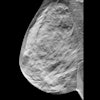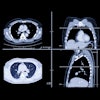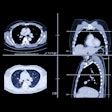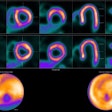
Providing second opinions on breast imaging exams performed elsewhere can be time-consuming, but many radiologists aren't adequately reimbursed for these reads, according to a new study in the Journal of the American College of Radiology.
Researchers led by Dr. Catherine Tuite of the ChristianaCare Helen F. Graham Cancer Center and Research Institute in Newark, DE, reviewed three years' worth of reports produced for second-opinion interpretations of breast imaging studies from external facilities.
They concluded that using partial full work relative value units (wRVUs) to compensate radiologists who performed second-opinion interpretations was insufficient for the work performed. Instead, full wRVUs are more commensurate with the work involved in second opinions.
"Because of the time and effort of both support staff members and radiologists, study-specific professional fees should be billed and credited to the performing radiologist," the authors wrote.
Although requests for second-opinion interpretations of external imaging studies are common, many radiologists are not appropriately reimbursed or credited for this work, according to the researchers.
In their study, Tuite et al sought to quantify the physician work effort for written breast radiology second opinions of studies from outside facilities. They also wanted to assess the downstream value of these interpretations to the radiology department and cancer center.
To accomplish those goals, the researchers retrospectively reviewed consecutive reports for "outside film review" produced from July 1, 2015, to June 30, 2018. They then estimated physician effort on the basis of the primary interpretation Medicare fee schedule for wRVUs by study-specific current procedural terminology (CPT) code and study type. Next, they compared this effort with the interpreting radiologist credit of 0.44 wRVUs per report provided at their institution for second-opinion interpretations.
Finally, they tracked subsequent imaging and management encounters generated from these second-opinion patient requests through June 30, 2019. Over the three-year period, 2,513 unique patient requests were submitted.
The researchers then specifically examined reports from January to March for all three years. Of these, 2,216 studies were reinterpreted -- with an estimated physician effort of 2,660 wRVUs, compared with 284 wRVUs if reimbursed using per-report credit.
Although wRVUs based on the study-specific CPT code ranged from 3,135 to 3,804 over the three years, the institutional RVU credit received for fiscal years 2015, 2016, and 2017, on the basis of the number of patient requests, was only 385, 375, and 345 wRVUs, respectively.
"We believe that our data support billing for the study-specific CPT code and crediting the interpreting radiologist with the full professional wRVUs for each study reviewed," the authors wrote. "Practices such as crediting only the wRVUs for the lowest value examination interpreted or assigning an arbitrary and highly discounted value not only significantly undervalue the work and time effort involved but also devalues the intellectual contributions and expertise of that physician."
The researchers also found that 2,353 imaging studies and image-guided procedures were performed on the evaluated patients from the first quarter of all three years. Sixty percent of those were for breast imaging studies, followed by radiography and fluoroscopy (14.7%), nuclear medicine studies (7.2%), and interventional radiology procedures (7%).
"Second-opinion interpretation of breast imaging studies adds value to a radiology department and institution by enabling downstream services for the care of new patients; this added revenue may help offset costs," they wrote.
Overall, the researchers believe their data may support the development of more widespread consensus regarding appropriate reimbursement practices for expert second opinions of radiologic studies, according to the authors.




















